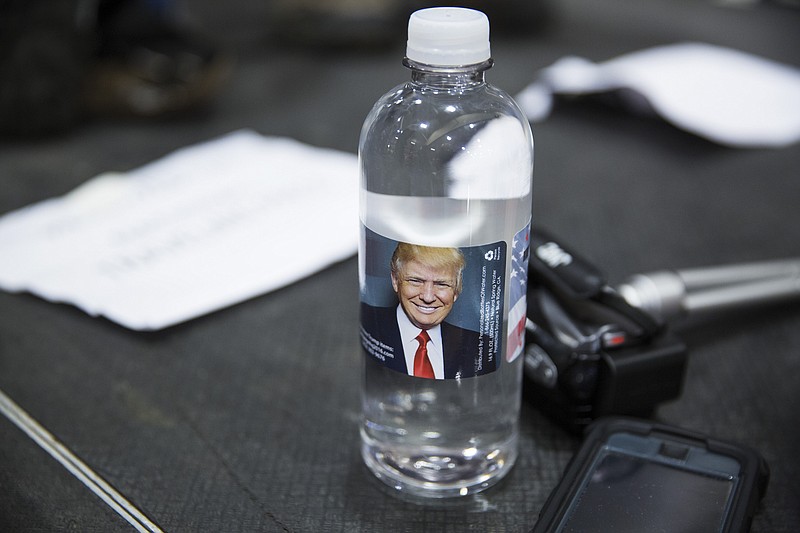Donald Trump's global deals would make it impossible for him to conduct foreign policy in many countries without either padding or depleting his wallet, according to an investigative article in the latest issue of Newsweek magazine.
"In the company of Trump," is the cover story of the Sept. 23, 2016, issue of Newsweek. And the cover tease reads: "If he wins, his many overseas deals would create a national security nightmare."
The story - which ends by questioning whether the foreign policy of the United States of America could be for sale - shows Trump has deep ties to global financiers, foreign politicians and even criminals, although it stops short of claiming to have uncovered any evidence that the Trump organization has engaged in illegal activities.
Trump, in his usual muddled way of talking, has indicated both that he would and would not put his business in a blind trust. Experts say that wouldn't be plausible anyway - his branded businesses are known and there's no true way to "blind" them. Trump also has said his children would take over the businesses. What? He'll not talk to them for four years?
Either way, the Newsweek reporting indicates there are contractual obligations that could not just be canceled. And it is those obligations that pose the possible conflicts problems.
"If Trump moves into the White House and his family continues to receive any benefit from the company, during or even after his presidency, almost every foreign policy decision he makes will raise serious conflicts of interest and ethical quagmires," according to Newsweek.
Those concerns go far beyond what we already know about Trump as a successful developer, a television personality and a failed casino operator. We know Trump suits are made in Mexico, Trump ties are made in China, Trump furniture is made in Turkey, and Trump crystal is made in Slovenia.
We know that he has had a number of failed businesses: Trump Airlines, Trump Steaks, Trump Magazine, Trump Vodka, Trump Casinos, Trump Mortgage, Trump Games, Trump Travel, the Trump Network, Trump Radio and Trump New Media and, of course, the New Jersey Generals professional football team. Most of all, we know about the now-defunct Trump University, now under investigation for fraud by the New York attorney general.
"What's been less clear is how globally extensive his business dealings have grown in recent years as he leveraged his TV fame to use his name in branding buildings and developments rather than products," according to Newsweek.
For instance, the Trump Organization has received as much as $8 million a year from Daewoo Engineering and Construction for a South Korean version of Trump World Tower and still remains allied with Daewoo despite political changes there.
You'll recall that earlier this year, Trump said South Korea should plan to shoulder its own military defense rather than relying on the United States, including the development of nuclear weapons. Well, one of the primary South Korean companies involved in nuclear energy, a key component in weapons development, is - you guessed it - Trump's partner, Daewoo Engineering and Construction. Daewoo could potentially get an economic windfall if the United States was less interested in protecting South Korea and we adopted the policies advocated by Trump.
But the South Korean concern pales beside that in Turkey, one of the few Muslim countries allied with America in the fight against the Islamic State. There, Trump's business partner, Aydin Dogan of the Dogan Group, has been indicted by the government on charges of fuel smuggling. The government - specifically President Recep Tayyip Erdogan, who just weathered a coup attempt - called for the Trump name to be removed from a Dogan Group tower complex in Istanbul.
Newsweek writes: "Trump would be in direct financial and political conflict with Turkey from the moment he was sworn into office. When faced with the prospect of losing the millions of dollars that flow into the Trump Organization each year from that Istanbul property, what position would President Trump take on the important issues involving Turkish-American relations, including that country's role in the fight against ISIS?"
The magazine makes it a point to explain how the Trump Organization differs greatly from the Clinton Foundation, the charitable enterprise that has been the subject of scrutiny over possible conflicts for the Democratic presidential nominee.
Any allegation that Hillary Clinton bestowed benefits on Clinton Foundation contributors in some sort of "pay to play" scandal when she was secretary of state "makes no sense because there was no 'pay,' according to Newsweek."
Money contributed to the Clinton Foundation was publicly disclosed and went to charitable efforts, such as fighting neglected tropical diseases that infect as many as a billion people. Newsweek notes that PricewaterhouseCoopers (PwC), a global independent accounting company, as well as the foundation's tax filings show that about 90 percent of the money it raised went to its charitable programs. No member of the Clinton family received any cash from the foundation, nor did it finance any political campaigns, and almost the entire board of directors, like the Clintons, works for free.
But the Trumps do make money off of their organization - millions of dollars, in fact. So any government wanting to seek future influence with President Trump could do so by maintaining or arranging a partnership with the Trump Organization, feeding money directly to the family - even if its held at bay until Trump is out of the White House.
"This is why, without a permanent departure of the entire Trump family from their company, the prospect of legal bribery by overseas powers seeking to influence American foreign policy, either through existing or future partnerships, will remain a reality throughout a Trump presidency," Newsweek states.
